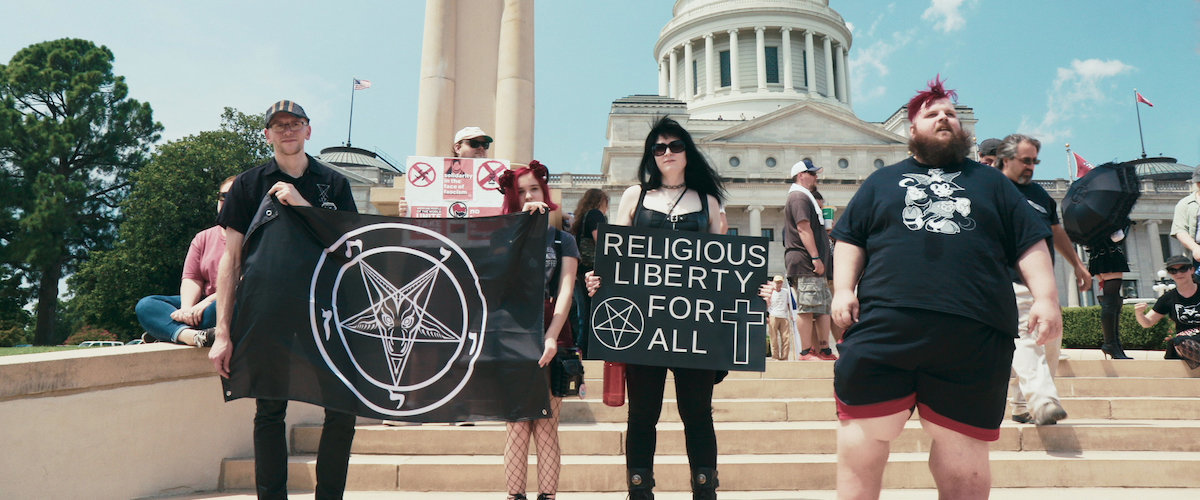'Hail Satan' film portrays satanists as trolls fighting Christian privilege
A still from Hail Satan? of Magnolia Pictures. The film premiered at the Sundance Film Festival in 2019.
(FILM REVIEW) The 2019 documentary Hail Satan? might just force Christians to ask themselves whether they really believe in religious freedom. The film shows the formation and political advocacy of The Satanic Temple, who are actually just a group of “nontheists”, pitching one hell of a fight against conservative Christians for greater separation of church and state in the U.S.
If I’m honest, this documentary was awesome. It was funny, serious and educational, though pretty one-sided. The director, Penny Lane, chose not to show other satanists’ criticism of The Satanic Temple and actually joined the group after editing the film. Her main aim seems to be to correct the record after the Satanist scare of the 1960s-1980s portrayed satanists as rapists and murderers who like heavy metal music. The satanists in her film don’t worship the devil. They don’t even believe in him.
“Everyone that I talked to about this was absolutely certain that they knew what satanism is and everyone I’ve talked to has been completely wrong,” Lane told The Guardian.
The film opens with a man dressed in a black cap and horns on Florida’s state capitol hill in Tallahassee, holding a big sign reading “Hail Satan! Hail Rick Scott.” Rick Scott is a well-known evangelical Christian politician in Florida who signed a controversial bill to allow prayer in school.
“I think there is a distinct need for a counterbalance against the dominant religious privilege in America today,” says an on-camera Lucien Greaves, the co-founder of The Satanic Temple.
Greaves wants to properly represent what a Santantist actually is. Judging from the film, that’s a nontheist troll dressed as the devil.
“It’s a founding aspect of Satanism that you troll people,” says Jesper Petersen, the author of The Invention of Satanism. “That’s the original troll isn’t it, to say to people ‘Yeah, I’m a Satanist,’ and to see what happens to people.”
The members of The Satanic Temple, started in 2013, use Satan as a figure to counter what they perceive as right-wing Christian privilege because Satan was the first being that disobeyed God, a bad authoritative figure in their eyes. Nontheists have an apathy toward belief in God or gods. The term is a little less explicit and less certain than atheism.
As a Christian watching the news, it can be easy for me to believe that my religious rights are at stake. Recent cases, like a nurse forced to participate in an abortion against her moral conscience, show that long-held religious beliefs like opposition to abortion or same-sex relationships are at times threatened or violated in the U.S.
The Satanic Temple is not opposed to religious freedom but wants all religions to be treated with equality, particularly pushing back against the idea that Christianity has a special place in America’s founding. If the state of Oklahoma can put a statue of the Ten Commandments on government property, then why not a Baphomet, a statue of the devil in goat form, they argue (with plenty of hilarity).
“You see Christian theocracy just creeping itself into our government and they’re not going to stop. They’re just gonna continue and it is our duty as the adversary to stand up to this,” says Michelle, a member of The Satanic Temple.
The Satanic Temple also has its own seven tenants, from acting with compassion and empathy to all creatures to having a science-based view of reality.
A lot of the Satanists discuss pain inflicted on them from the Christian churches they left. They still hope for Christians to recognize their perspective.
“I think we can all come together and have a reconciliation and all coexist,” says Mason, a member of the Temple.
Who would’ve thought: a Satanist sounding like a Christian.
Princess Jones was an intern with ReligionUnplugged and an editorial clerk at the New York Post. She is a recent alumna of Trevecca Nazarene University in Nashville, Tenn., and of the NYC Semester in Journalism at The King’s College in New York.

